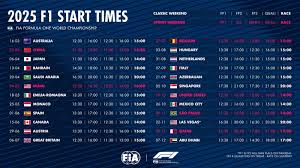Understanding F1 Start Time: Its Importance and Impact

The Significance of F1 Start Time
Formula 1 racing is one of the most exciting sports globally, with millions of fans tuning in to watch each race. The start time of each event plays a crucial role not only for the teams competing but also for the fans watching from home or at the track. Knowing when a race starts is essential for scheduling, making logistics crucial both for teams and broadcasters.
Factors Affecting F1 Start Time
F1 start times are influenced by a variety of factors including the location of the race, weather conditions, and international broadcasting schedules. Each Grand Prix is strategically scheduled to maximise the audience opportunity globally. For instance, races in Europe generally commence in the afternoon to accommodate widespread viewership across European countries, while races in locations such as Asia or America may have earlier start times to maintain a prime-time slot in Europe.
Recent Developments on F1 Start Times
As of the latest season, the FIA has implemented a series of changes to the F1 calendar, adjusting several start times to suit new fan engagement strategies. For example, the 2023 season saw races in Miami and Las Vegas start later in the day to attract more spectators at the track and enhance TV ratings. These adjustments suggest a shifting trend in the approach to timing, where flexibility has become vital in making races more accessible to a global audience.
Conclusion: The Future of F1 Start Times
The start time of F1 races is more than just a schedule; it signifies an intricate balance between sporting tradition, commercial viability, and fan engagement. As Formula 1 continues to evolve, particularly with expanding markets in the United States and Asia, understanding start times will remain essential. Fans can expect future modifications based on viewership trends, ensuring they can enjoy these thrilling competitions in an increasingly dynamic timetable.






